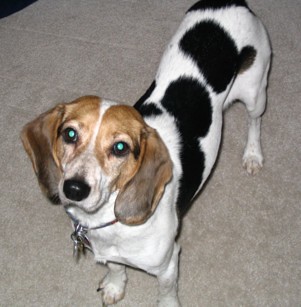
Today we took Tinker to see Dr. Christiane Massicotte, the new Neurologist/Neurosurgeon at the AERA. We've been seeking answers for such things as, "Is there more we can do to help Tink's progress?", "Should we allow Tinker to move freely about the house (not near the stairs of course)?", "What should we do when his 12 weeks of hydrotherapy are over?” etc... We also wanted to know if there was a reason why Tinker has been urinating less on his own, and why it had been becoming harder for us to express him.
Dr. Massicotte was absolutely wonderful. She patiently answered all of our questions, gave suggestions, and was very accommodating. She feels that Tinker is making good progress and she said that the most significant neurological recovery occurs during the first 6 months after surgery. After that, it is much more gradual and changes are more subtle. We are going to start letting Tinker slowly have the run of the downstairs part of the house (we will be purchasing gates to block off the stairs) so that he gets more of an opportunity to be on his feet.
 Dr. Massicotte said we may want to consider continuing with the hydrotherapy after the initial 12 week period (maybe it's time to fill up the tub, or maybe they'll let us register for a pass for him at our complex's pool
Dr. Massicotte said we may want to consider continuing with the hydrotherapy after the initial 12 week period (maybe it's time to fill up the tub, or maybe they'll let us register for a pass for him at our complex's pool  ). She also recommended that we get boots for Tinker's back legs so that when walking outside, we don't have to hold up his back feet up when we are on the sidewalk. This will allow him to walk or drag his feet without getting cut up and enable him to feel the sensation of the ground.
). She also recommended that we get boots for Tinker's back legs so that when walking outside, we don't have to hold up his back feet up when we are on the sidewalk. This will allow him to walk or drag his feet without getting cut up and enable him to feel the sensation of the ground.She tested Tinker's reflexes and deep pain sensation and had us take him outside so that she could watch him try to walk in a straight path with no assistance. Tinker was kind of up and down and swayed a bit, but she was quite encouraged by what she saw. Up until today we had thought that dogs did one of two things in recovery, regular walking or 'spinal walking'. (Spinal walking looks like a dog is a little drunk -- it comes from trying to process the thought of walking. It basically bypasses the brain and relies on muscle memory.) As it turns out, Tinker actually is doing a combination of both. There have been studies that suggested that if there is no deep pain sensation, it was spinal walking, and if there is deep pain sensation, then it was regular walking. However, Dr. Massicotte did extensive studies at Penn, and she found that there are many cases, and Tinker is one of them, where the dog does a combination of spinal walking and regular walking.
As for his sudden change in the bladder functions- having difficulty going on his own, Dr. Massicotte put Tinker on a low dose of Valium. It is used to relax the tone of the bladder a little and to try to encourage him to go more on his own. Usually it is not prescribed for more than a few weeks. If it takes longer, maybe we'll start taking it.

All in all, it was a very rewarding day. We got good answers and were reassured that we are going about things the right way for our Little Dude.


No comments:
Post a Comment